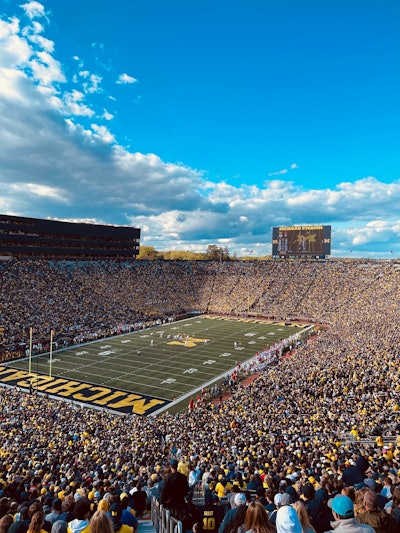
The University of Michigan led the nation in attendance this football season, and it could be argued that it likely led the nation in the amount of garbage produced at its seven home games.
As reported by MLive, a waste reduction program piloted this year redirects the stadium’s compostable garbage to a student-staffed Campus Farm by the Mattaei Botanical Gardens.
The program implemented for the Nov. 4 Purdue game brought at least two tons of compost to the farm in northeast Ann Arbor, said the program’s manager Alison Richardson of the university’s Office of Campus Sustainability.
The stadium’s compost consists of food items, as well as compostable containers, such as cups, trays, napkins and pizza boxes. The garbage is collected at the stadium, separated by contractors to remove recyclable items such as plastic bottles, and the compost is sent to the farm, Richardson told MLive's Samuel Dodge..
The Ann Arbor campus produces more than 1,100 tons of compost each year, Richardson said.
The program aims to not only point hundreds of thousands of eyeballs to the university’s zero-waste goals, but also to provide nutrients for the farm as a living-learning lab for students. “The stadium is a really visible way to demonstrate our commitment to sustainability and also introduce the concept of zero waste to a lot of people who may not be familiar with it coming to the stadium,” Richardson said.
The university seeks to reduce its landfill waste by 40 percent as part of its sustainability goals, said Anya Dale, manager of sustainable systems and waste reduction in the Office of Sustainability. When compostable waste is sent to landfills, natural decomposition creates methane that contributes to climate change, Dale said.
“If you keep that stuff out of the landfill, and actually get it into places like Campus Farm, the waste can return to soil within a few months,” Dale said, adding that soil becomes a sort of “carbon sink.”
The stadium recycles and composts more than 75 percent of the waste generated at home football games, officials said.
This stadium-to-farm effort partners the sustainability office, the gardens, the athletic department, university operations grounds staff and waste management services, officials said.
Campus Farm involves almost 2,000 students performing day-to-day tasks for a variety of classes, including ecology, organic farming and sustainability, said farm program director Jeremy Moghtader. The farm attracts students from even more disciplines such as business, law and beyond, he added.
The farm requires anywhere between 50 to 150 yards of compost at any one time of the year, Moghtader said. The work yields various crops such as cherry tomatoes or rainbow chard to provide produce for residence hall dining and the student food bank, he said.
Officials will test the compost over the ensuing months to see if it can be used at the Campus Farm. If successful, the pilot program will expand to redirect more Michigan Stadium waste to the farm, Dale said. “It could scale up from just one game to more,” she said.

































